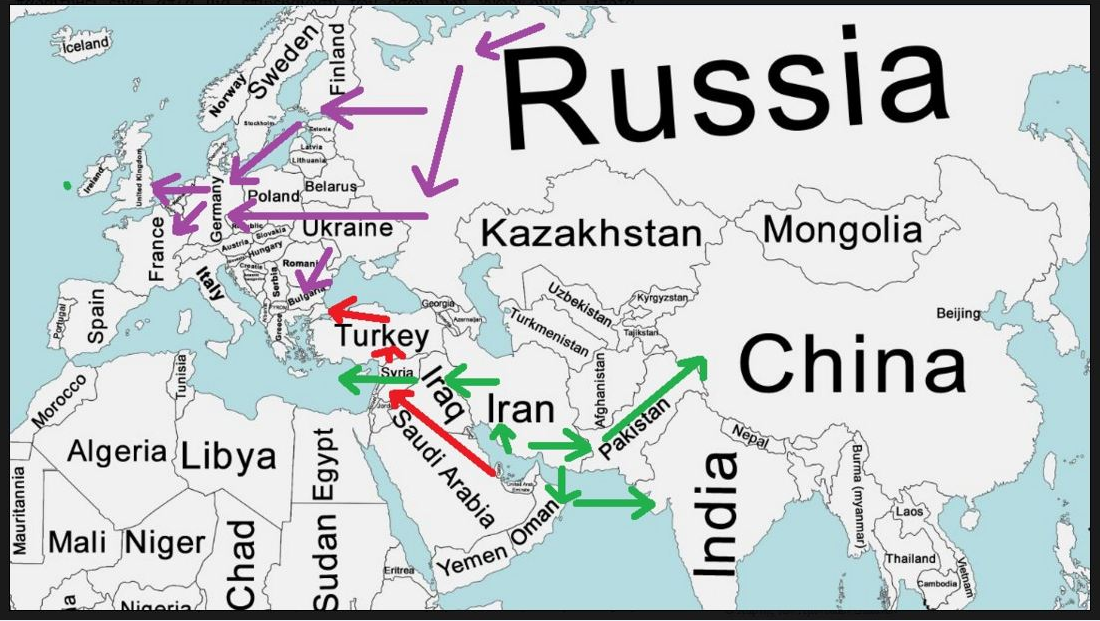Syria : The Economic Interests
Yesterday I uploaded a Financial Times article which revealed that Putin asked the Syrian dictator Bashar al Assad to consider stepping down. See “Vladimir Putin asked Bashar al-Assad to step down”, January 2016
http://www.ft.com/intl/cms/s/0/735b4746-c01f-11e5-9fdb-87b8d15baec2.html#axzz3xz5q4y00
Someone might have just read the title, and think that this happened yesterday, and expect Assad to go in a couple of days. But that’s not at all how the story goes. According to the Financial Times, Igor Sergun, a Russian General, was sent by Putin on the 3rd of January 2016 in order to ask Assad to consider stepping down, in order for a solution to be reached in Syria. Remember that almost at the same time the Russians said they could offer Assad asylum. See Guardian “Putin hints that Russia could grant asylum to Assad”, January 2016.
http://www.theguardian.com/world/2016/jan/12/putin-russia-assad-asylum-snowden
The article is not important because it says that Assad will go, because that’s not at all what it says. Actually the Financial Times writes that the Russians deny that they suggested to Assad that maybe it is time for him to go. The article is important because it confirms what we already know about Syria. And what do we know so far? We know that it would be good for Russia if Assad stepped down, because Bashar al Assad is the main Iranian ally in the Middle East, and his removal would calm the Turks and the Arabs of the Gulf.
Therefore the war between Russia on one hand and the Turks and the Arabs on the other could cool down with Assad gone. The reason is that the Turks and the Arabs could accept Russia as a second best solution in Syria, in order for Russia to guarantee that the Iranians and the Iraqis will not export oil and gas to the Mediterranean Sea through Syria. If the Iranians and the Iraqis were to do that they would create competition for the Arabs and the Russians in Europe, and they would also bypass Turkey as an energy corridor.
Map 1 The War for the Pipelines

But as I have already said if the Russians were to consent to Assad’s fall, the Iranians could decide to send oil and gas to Europe through Turkey to retaliate. On the contrary, as long as the Russians help Assad to stay in power, the Iranians will prioritize sending their oil and gas to China through Pakistan, and to India through Oman, in order to avoid India’s main enemy i.e. Pakistan. That way the Iranians would not hurt the Russian interests, since Russia does not sell natural gas to China and India. Russia has signed some agreements with China but it is very doubtful that they will come to life. They were mainly meant to scare the European Union.
Therefore the Financial Times article is important as a confirmation of what we already know, and not as a prediction of what will follow. Assad would go any time Russia decided so. Russia would not even have to overturn Assad herself. Russia could simply withdraw her forces from Syria, and Assad would fall, because the Iranians could not stop the Turks and the Arabs without the Russians. Obviously the Russians are not willing to let Syria fall in the hands of the Turks and the Arabs, because they would construct the Arab-Turkish pipelines, for example the Qatar-Turkey pipeline that the Arabs and the Turks agreed on in 2009, and which was blocked by Assad in Syria. Assad blocked the Qatar-Turkey pipeline in order to protect the Russian and Iranian interests, and agreed to the Iran-Iraq-Syria pipeline, which would be constructed and managed by Gazprom.
I would like to make a summary of the major economic interests in Syria, because the main interests are really straightforward, and they tell the whole story in Syria. The problem is that they are moving in ways that make it very difficult to reconcile.
Russia : Russia’s first priority is to prevent the Arab-Turkish (Sunni) Pipelines, and also to prevent the Iran-Iraq-Syria (Shia) Pipelines. The second Russian priority is to construct and manage the Iran-Iraq-Syria pipeline if one of the two must definitely go ahead.
Iran: The Iranian dream has always been to reach the Mediterranean Sea and export their oil and gas to Europe. It has been centuries since the Iranians do not have access to the Mediterranean Sea.
Iraq: The Shia Arabs of Iraq, who are the majority of Iraq and came to power after the Americans overtunred the minority of Sunni Arabs (Saddam Hussein) who were running Iraq, are competing with the Iranians in the Persian Gulf, because they are both oil and gas exporters. However in Syria the Shia Arabs of Iraq, whom we called the “Government of Baghdad”, are supporting the Iranians.
The Iraqis agreed to allow the Iranians to send their oil and gas to Syria and the Mediterranean Sea through Iraq, in order for the Iranians to allow the Iraqis to send their oil and gas to the Mediterranean Sea through Syria, which is a very strong Iranian ally. However the Iraqis and the Iranians are not natural allies. Probably the opposite is true, and if at some point the Iraqis believe that they have more chances to export their oil and gas to Europe or Turkey through the Sunni alliance, they could change sides. But for now the Shia Iraqis are supporting the Iranians in Syria.
Turkey: Turkey wants the Arab-Turkish pipelines to go ahead and also Turkey wants to block the Iranians and the Iraqis from reaching the Mediterranean Sea, because they would bypass Turkey as an energy hub. Turkey wants free elections in Syria, in order for the Sunni minority to rise to power, something that would open Syria’s door to Turkey. Turkey wants Syria to become a Turkish satellite, since Turkey is the strongest military power of the Muslim world.
The Arabs of the Persian Gulf : In Syria the Arabs of the Persian Gulf have almost the same interests with the Turks. The Arabs want the construction of the Arab-Turkish pipelines, and also to block Iran’s exit to the Mediterranean Sea. However the Arabs would prefer Syria under Arab rather than Turkish influence, but they would definitely prefer Turkish than Iranian influence over Syria, because Turkey does not have oil and gas to export through Syria.
The United States: Syria is not very important for the United States, because she is poor in oil and gas. The rich in oil and gas Iraq is a lot more important for the Americans, and that’s why the Americans care a lot more for their Shia Arabs allies in South Iraq, and their Kurdish allies in Northern Iraq. Both of these American allies are very rich in oil and gas. In Syria the Americans support the Kurds, the Turks and the Arabs support the Syrian Sunni Islamists, and the Russians and the Iranians support the Syrian Alawites of Bashar al Assad.
In Syria the Americans are attacking the Sunni Syrians who are supported by Turkey when they attack the Syrian Kurds, and to make things up to Turkey they support Turkey against Russia in Syria. That’s why the Americans are asking for Assad to go. But the Americans are calling for Assad to go with less and less enthusiasm. Erdogan’s Turkey is not the ally she used to be for the United States, and I think that for the United States it would be much better if the Iranians controlled Syria rather than the Turks. The Americans are already too heavily dependent on Turkey, and I do not think they would be very happy to see their dependency on Turkey rising. But it does not seem realistic to expect the Iranians to control Syria. Probably the Alawite part of Syria will be controlled by Russia, and the Sunni part of Syria will be controlled by the Turks and the Arabs of the Gulf.
For the United States the best scenario would be for all the pipelines to go ahead i.e. the Arab-Turkish Pipelines (Qatar-Turkey), the Iran-Syria Pipeline (Shia Pipelines), and the Caspian Sea-Turkey-Europe Pipeline (Southern Energy Corridor), in order for no one to have too much influence over the American allies in Europe. But this scenario is a midsummer night’s dream.
China: For China, Syria is not very important either. Iraq is important for China. For China and the United States oil and gas rich countries like Iraq are always more important than oil and gas poor countries like Syria. On the contrary, for the oil and gas rich Russia the importance is not on the oil and gas but on the corridors of oil and gas. Iraq is a source of oil and gas and interests more the US and China, and Syria is a corridor for oil and gas and interests more Russia.
What is important is that the economic interests in Syria are very straight forward, and you can know what is happening in Syria simply by looking at the map I provide above. The problem is that these straightforward interests are moving in very opposite directions, and are very difficult to reconcile. But articles like the one from the Financial Times cannot tell us something that we do not already know about Syria, because things in Syria are already pretty simple.








